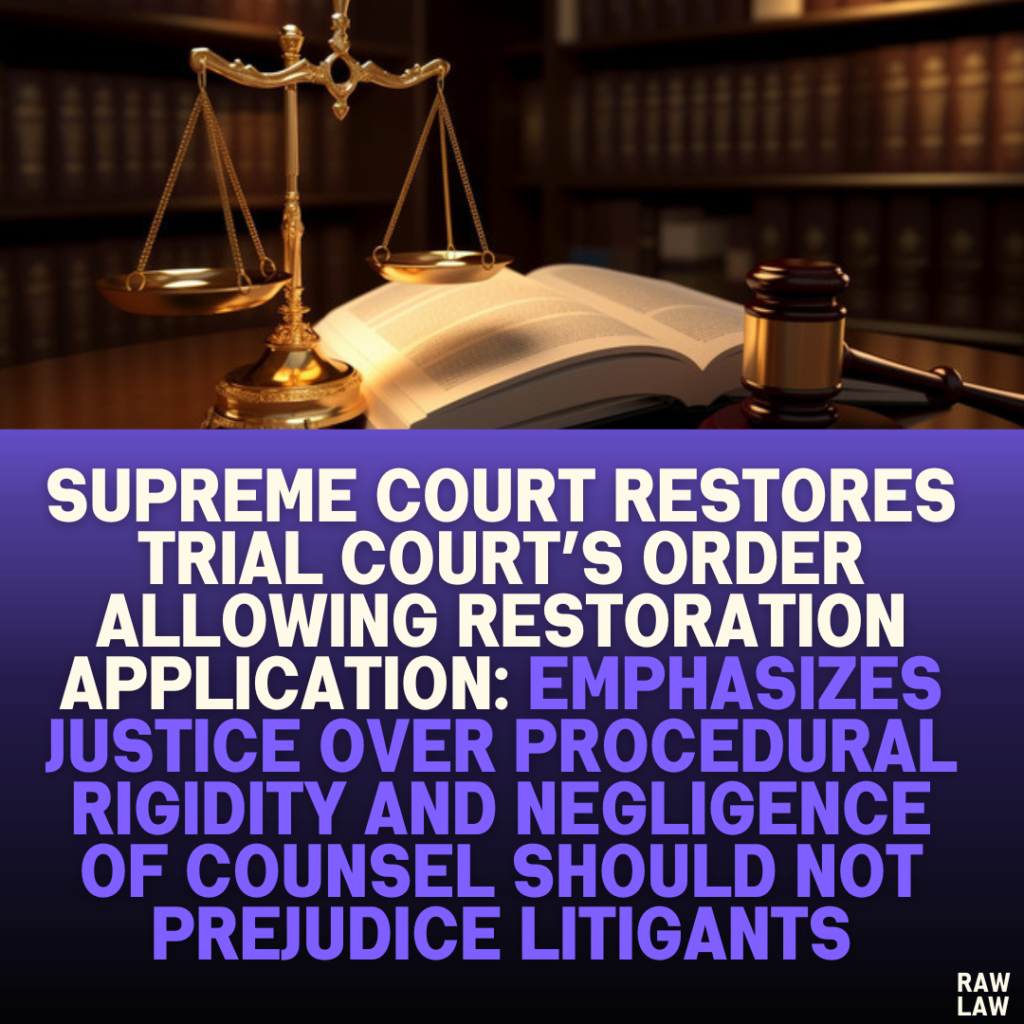Court’s Decision
The Supreme Court of India allowed the appeal and restored the Trial Court’s decision, which had permitted the appellant’s restoration application under Order IX Rule 13 of the CPC. The Court emphasized that procedural rules should serve justice and not hinder it. It directed the Trial Court to expedite the hearing and resolve the matter within one year.
Facts
- The respondent had filed a civil suit (O.S. No. 81 of 1988) to declare a sale deed null and void, alleging that the appellant had fraudulently executed the sale deed in his favor by taking advantage of the respondent’s grandfather’s vulnerable condition.
- The suit was decreed ex parte by the Trial Court in 1994 due to the non-appearance of the appellant.
- The appellant, unaware of the proceedings, later discovered the ex parte decree and filed a restoration application on 31.10.1994, invoking Order IX Rule 13 and Section 151 of the CPC. The appellant claimed that his previous counsel had failed to inform him about the proceedings.
- The Trial Court allowed the restoration application, recognizing the appellant’s illiteracy, good faith, and the fact that his ignorance was due to his previous counsel’s negligence.
- The respondent challenged the Trial Court’s order in a revision petition before the District Court, which reversed the Trial Court’s decision, citing the absence of a condonation application under Section 5 of the Limitation Act.
- The appellant filed a writ petition before the Allahabad High Court, which upheld the District Court’s decision, holding that the restoration application was barred by limitation.
Issues
- Whether the restoration application under Order IX Rule 13 required a separate application for condonation of delay.
- Whether procedural technicalities should override substantive justice in cases where a party has acted in good faith.
Petitioner’s Arguments
- Delay Justification: The appellant argued that he came to know about the ex parte decree on 27.10.1994 and promptly filed the restoration application on 31.10.1994. Thus, the application was within the time frame calculated from the date of knowledge.
- Good Faith: The appellant contended that he was an illiterate person who had placed complete trust in his previous counsel. The failure to act promptly was due to the counsel’s negligence, not his own.
- No Need for Separate Application: The appellant maintained that the reasons for the delay were adequately explained in the restoration application itself, making a separate condonation application unnecessary.
Respondent’s Arguments
- Time Barred: The respondent argued that the restoration application was filed beyond the 30-day limitation period prescribed under Order IX Rule 13, calculated from the date of the decree (11.04.1994).
- Lack of Compliance: It was contended that without a formal application for condonation of delay under Section 5 of the Limitation Act, the restoration application was not maintainable.
- Knowledge of Decree: The respondent claimed that the appellant had prior knowledge of the ex parte decree but deliberately delayed filing the restoration application.
Analysis of the Law
- Order IX Rule 13 and Section 5 of the Limitation Act: The Court examined whether a separate condonation application was mandatory. It noted that where reasons for the delay are inherently intertwined with the merits of the case, as in this instance, a separate application is unnecessary.
- Role of Procedural Law: The Court emphasized that procedural rules are meant to facilitate justice and should not obstruct the resolution of disputes on merits. The principle, “Procedure is the handmaid of justice,” was reiterated.
- Good Faith and Bona Fide Conduct: The Court highlighted that the appellant had acted promptly upon learning about the ex parte decree, and his conduct was in good faith. His illiteracy and reliance on counsel were critical factors.
Precedent Analysis
- Rafiq v. Munshilal (1981): The Court held that a party should not suffer due to their counsel’s negligence, as litigants often lack knowledge of legal procedures and rely entirely on their advocates.
- Bhagmal v. Kunwar Lal (2010): The Court ruled that restoration applications under Order IX Rule 13 can inherently address delay, eliminating the need for a separate condonation application if justified reasons are provided within the main application.
Court’s Reasoning
- Technicalities Should Not Overrule Justice: The Court observed that justice should not be sacrificed at the altar of procedural technicalities, especially when the party has acted in good faith and the delay has been satisfactorily explained.
- Negligence of Counsel: It emphasized that the appellant’s reliance on his previous counsel, who had failed to inform him about the proceedings, should not lead to his penalization.
- Judicial Discretion: The Trial Court had exercised its discretion appropriately in allowing the restoration application, and the revisional jurisdiction of the District Court should not have been invoked to interfere with a justifiable order.
Conclusion
The Supreme Court allowed the appeal, set aside the orders of the High Court and the District Court, and restored the Trial Court’s decision to allow the restoration application. The matter was remanded to the Trial Court for expedited disposal within one year.
Implications
This judgment underscores the judiciary’s commitment to substantive justice over procedural rigidity. It reinforces the principle that courts must ensure fair outcomes, particularly when procedural lapses are not attributable to the party but to their counsel. The decision is a reminder that the judicial process should be accessible and fair, especially for vulnerable litigants.



